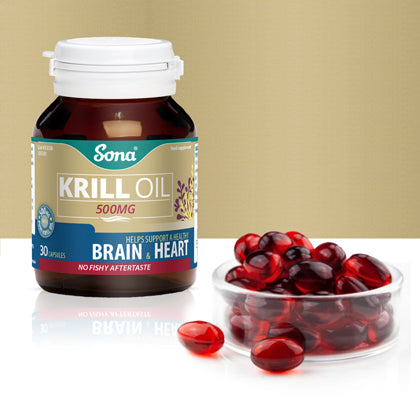
What is Krill Oil and should you take it?
In recent years, krill oil has become a common dietary supplement. Krill oil is similar to standard fish oil in regard to being rich in omega-3 fatty acids, such as EPA and DHA. However, their origin, health benefits, and effectiveness may differ.
In this article you will find:
- What is krill oil?
- Is krill oil better than fish oil?
What is krill oil?
Krill oil is derived from krill, a small crustacean fish found in the Antarctic waters of the Southern Ocean. Krill oil has been linked to numerous benefits. This includes improving heart health, lowering blood sugar, fighting inflammation, managing PMS symptoms, reducing levels of fats in the blood, reducing LDL cholesterol (the “bad cholesterol”), decreasing swelling, and treating dry eye.
Is krill oil better than fish oil?
Fish oil is extracted from various fatty fish, such as anchovies, mackerel, and salmon. Fish oil is rich in omega-3 fatty acids such as eicosapentaenoic acid (EPA) and docosahexaenoic acid (DHA). EPA and DHA contribute to the normal function of the heart, and DHA also contributes to the maintenance of normal brain function and vision.
Like fish oil, krill oil is also rich in EPA and DHA. However, the fatty acids found in krill oil are structurally different that those in fish oil.
The fatty acids in fish oil are found in the form of triglycerides. In krill oil, they are found in the form of phospholipids. Many studies have shown that fatty acids found in the form of phospholipids are more easily absorbed and used better by the body, and thereby may be more effective at treating and reducing illness and disease.
Krill oil also contains more antioxidants than fish oil. Antioxidants are substances that helps protect the body against free radicals, a type of molecule that can cause cell damage. Astaxanthin, a naturally occurring antioxidant found in krill oil, has been linked to healthier skin, endurance, heart health, and joint pain to name a few.
Sona Extra Strength Krill Oil is a small capsule with no unpleasant fishy odour, taste, or aftertaste, with 25% more EPA/DHA than standard Krill Oil products. The higher levels of Phospholipids in Sona Extra Strength Krill Oil increase the bioavailability of the omega 3 fatty acids. Sona Extra Strength Krill Oil also contains choline which supports the liver, and aids in the healthy digestion of fats.
It is important to consult your doctor before taking krill or fish oil, if you are on any blood-thinning medication or have a blood disorder, as they may affect blood clotting.
References
- Costanzo, M., Cesi, V., Prete, E., Negroni, A., Palone, F., & Cucchiara, S. et al. (2016). Krill oil reduces intestinal inflammation by improving epithelial integrity and impairing adherent-invasive Escherichia coli pathogenicity. Digestive And Liver Disease, 48(1), 34-42. doi: 10.1016/j.dld.2015.09.012.
- Harel, Z., Biro, F., Kottenhahn, R., & Rosenthal, S. (1996). Supplementation with omega-3 polyunsaturated fatty acids in the management of dysmenorrhea in adolescents. American Journal Of Obstetrics And Gynecology, 174(4), 1335-1338. doi: 10.1016/s0002-9378(96)70681-6.
- Köhler, A., Sarkkinen, E., Tapola, N., Niskanen, T., & Bruheim, I. (2015). Bioavailability of fatty acids from krill oil, krill meal and fish oil in healthy subjects–a randomized, single-dose, cross-over trial. Lipids In Health And Disease, 14(1). doi: 10.1186/s12944-015-0015-4.
- Maki, K., Reeves, M., Farmer, M., Griinari, M., Berge, K., & Vik, H. et al. (2009). Krill oil supplementation increases plasma concentrations of eicosapentaenoic and docosahexaenoic acids in overweight and obese men and women. Nutrition Research, 29(9), 609-615. doi: 10.1016/j.nutres.2009.09.004.
- Mori, T. (2014). Omega-3 fatty acids and cardiovascular disease: epidemiology and effects on cardiometabolic risk factors. Food Funct., 5(9), 2004-2019. doi: 10.1039/c4fo00393d.
- Schuchardt, J., Schneider, I., Meyer, H., Neubronner, J., von Schacky, C., & Hahn, A. (2011). Incorporation of EPA and DHA into plasma phospholipids in response to different omega-3 fatty acid formulations - a comparative bioavailability study of fish oil vs. krill oil. Lipids In Health And Disease, 10(1), 145. doi: 10.1186/1476-511x-10-145.
- Ulven, S., & Holven, K. (2015). Comparison of bioavailability of krill oil versus fish oil and health effect. Vascular Health And Risk Management, 511. doi: 10.2147/vhrm.s85165.
